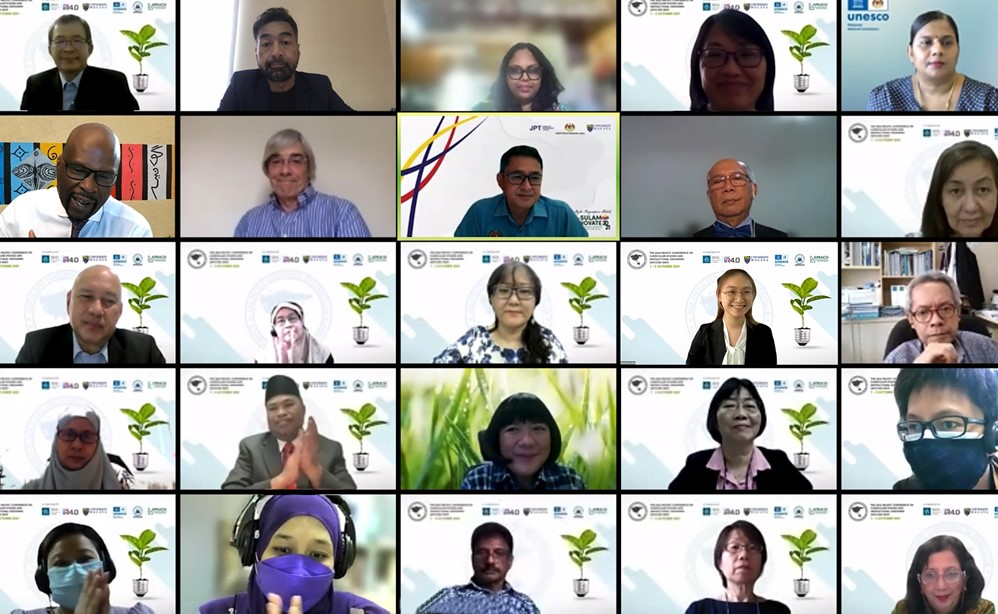SEGi University proudly partnered with University Malaya, IBE-UNESCO, Association of Professional in Curriculum and Educational Instruction Malaysia (APROCEI), Asia Pacific Research Association on Curriculum Studies Inc. (APRACSI), to host the Asia Pacific Conference on Curriculum Studies And Instructional Designing (APCCSID 2021) with the theme of Curriculum and Instructional Design for Sustainable Development. Going into the 21st century, the world faces unprecedented crises such as climate change, global warming, famine, war, conflict, and disasters in many parts of the world. As such, sustainability has become a keyword that may well save the world.
The conference aimed to raise awareness of the roles and impact of curriculum and instruction towards achieving education for sustainable development as well as provide a global setting for experts, curriculum developers, policymakers, researchers, and students to address issues and research of curriculum studies regarding sustainable development. The conference is a platform for discussion, collaboration on curriculum matters amongst the educators from preschool to universities levels.
Together with participants from around the world, IBE UNESCO, and Asia Pacific Research Association on Curriculum Studies Inc. (APRACSI), as co-organizers of the event, have helped publicized the conference internationally.
The advice from Director General of Higher Education, YBhg Prof Dato’ Dr. Husaini Omar is most practical and pertinent: “Education for sustainable development is not purely academic. It requires a sense of agency, it requires action. I have seen universities and schools embarking on project works and co-curricular activities on sustainable development. This kind of activities generate sustainable interest among students and local communities. It is also a good opportunity for interdisciplinary learning and cooperation. Knowledge is enriched through problem solving cross-disciplinarily. The sustainable development theme provides a rich basis for this to materialise.”
Mr Ydo Yao, Director of IBE UNESCO, keynote speaker for the conference lamented that “We are at a turning point in the history of mankind. We shall address key questions with no delay. If we don’t do it we will leave the younger generation with no sustainable future, curriculum need to be rethought in light of fundamental considerations such as understanding of curriculum as a dynamic process reflecting social aspirations as well as the transformative power of curriculum.
Mr Ydo Yao pointed out that, “Covid-19 has significantly contributed to the discussions around two main issues. On one hand, there has been an exploration and testing of proposals and pathways with regard to the integration and synergies between in-person and distance education; removing barriers and discontinuities among educational levels, settings, and provisions; and, crucially, revisiting educational aims, contents and strategies.”
Inclusive education is a necessary component of Education for Sustainable Development. “Provision of inclusive education is foundational to ensure quality and equitable education for all learners. Key education leaders must be committed towards inclusive education encompassing education for special needs children, closing the gap between performance and educational opportunities and resources for children in urban and rural areas,” quoted Datuk Dr Habibah, Senior Fellow at MASA and member of National Recovery Council Malaysia, who is also a keynote speaker.
“Inclusive education must also focus on improving basic literacy and numeracy skills among learners. Ministry of Education Malaysia has meticulously and systematically design data-driven initiatives in bringing forth quality education for all children in Malaysia”, she added.
The conference was conducted virtually from 1 to 3 October 2021. A pre-conference student’s symposium was held on 30 September 2021.
SEGi is honoured to be collaborating not just with educators from Malaysia but other parts of the world as well. This is specifically in raising the awareness of the importance of sustainability thinking. Focusing on the philosophy and principles, learning that leads to action develops students’ thinking and problem-solving skills.

